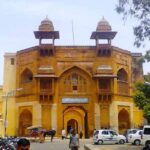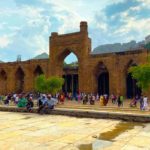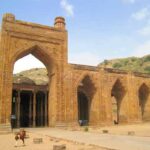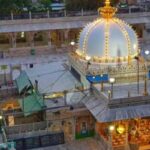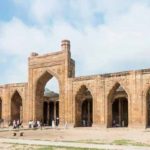Top 10 Things to Do in Ajmer, located in the heart of Rajasthan, India, is a city steeped in history and culture, offering a myriad of activities for visitors. The iconic Ajmer Sharif Dargah, a revered Sufi shrine, is a must-visit for spiritual seekers and history enthusiasts alike. Take a stroll around the serene Ana Sagar Lake, surrounded by lush gardens and historic pavilions, providing a peaceful retreat.
Explore the grand Taragarh Fort, which offers panoramic views of the city and its surroundings. The Akbari Fort and Museum showcase the rich heritage of the region, housing an impressive collection of artifacts. For a tranquil escape, visit the picturesque Foy Sagar Lake, where you can relax amidst nature.
Ajmer is also known for its vibrant markets, such as the Dargah Bazaar and Naya Bazaar, where you can shop for traditional Rajasthani handicrafts, textiles, and jewelry. Don’t miss the chance to savor the local cuisine, with the city’s diverse culinary offerings ranging from spicy street food to royal Rajasthani thalis.
Engage in cultural experiences by attending the annual Urs festival at the Ajmer Sharif Dargah, where the city comes alive with music, dance, and a lively atmosphere. With its blend of spirituality, history, and vibrant culture, Ajmer promises a memorable and enriching experience for every traveler.
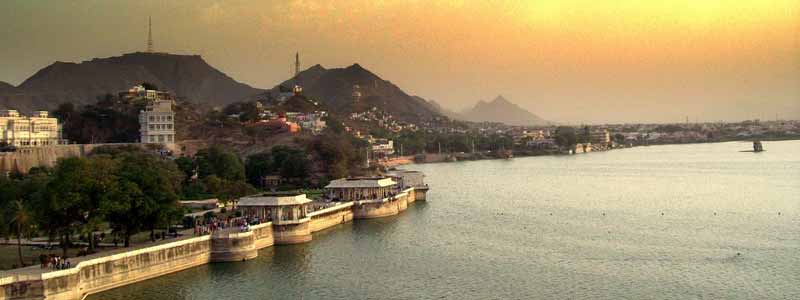
Ana Sagar Lake – Indulge In Boating
Ana Sagar Lake, located in the heart of Ajmer, Rajasthan, India, is a historic artificial lake that holds a significant place in the city’s cultural and recreational landscape. Built by Anaji Chauhan, the grandfather of Prithvi Raj Chauhan, in the 12th century, the lake spans an impressive 13 kilometers in circumference and is surrounded by picturesque gardens and pavilions.
The lake is a popular destination for both locals and tourists, offering a serene escape from the bustling city life. Boating is a common activity on the lake, allowing visitors to enjoy the scenic beauty and the cool breeze. The nearby Daulat Bagh, a meticulously landscaped garden, adds to the charm of the area, providing a peaceful retreat with well-maintained lawns and floral arrangements.
Visitors to Ana Sagar Lake can also explore the historic structures around its shores, such as the beautiful marble pavilions, including the Baradari, and the Daulat Khana, both built during the Mughal era. These architectural gems offer glimpses into the rich history of the region Top 10 Things to Do in Ajmer.
Whether it’s a leisurely boat ride, a quiet stroll in the garden, or a visit to the historic structures, Ana Sagar Lake stands as a testament to Ajmer’s cultural and architectural heritage, attracting visitors with its beauty and historical significance.
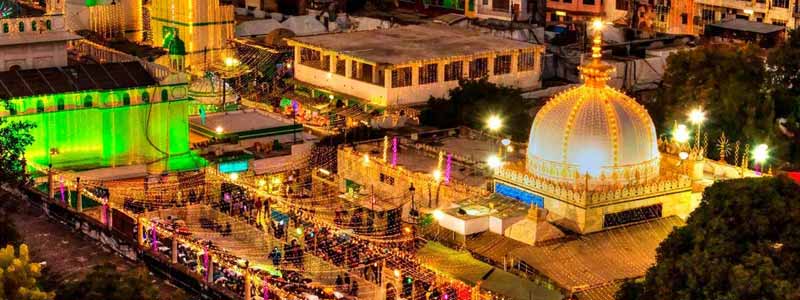
Ajmer Sharif Dargah – Seek Blessings
Ajmer Sharif Dargah, located in the city of Ajmer, Rajasthan, India, is one of the most revered Sufi shrines in the country. The Dargah is the final resting place of Khwaja Moinuddin Chishti, a 13th-century Sufi saint who played a significant role in spreading Sufism in India.
Devotees from various faiths and backgrounds visit Ajmer Sharif Dargah to seek blessings and offer prayers. The shrine’s serene atmosphere promotes unity and tolerance, embodying the spirit of Sufism that transcends religious boundaries, Top 10 Things to Do in Ajmer.
The architecture of the Dargah is a blend of Mughal and Indian styles, adorned with intricate designs and calligraphy. The main attraction is the tomb of Khwaja Moinuddin Chishti, covered with a canopy of silver and gold.
Every year, during the Urs festival, the Dargah witnesses a massive influx of pilgrims, commemorating the saint’s death anniversary. Qawwali performances, the devotional music of the Sufis, add a spiritual dimension to the ambiance.
Ajmer Sharif Dargah serves as a symbol of peace, love, and harmony, attracting people from different walks of life who come together to experience the spiritual aura of this sacred place.
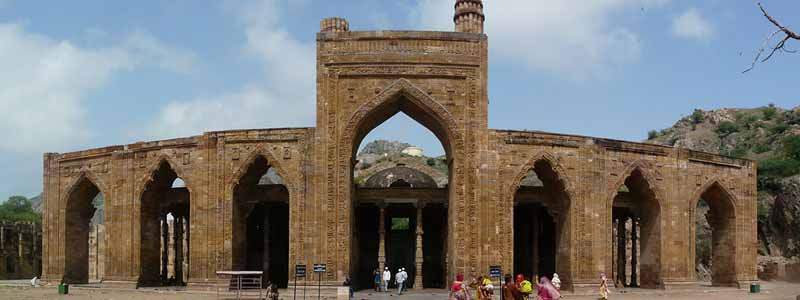
Adhai Din Ka Jhonpra – Learn Its Legends!
Adhai Din Ka Jhonpra is a historical mosque located in Ajmer, Rajasthan, India. The name translates to “shed of two and a half days,” and it has an intriguing origin. Initially built as a Sanskrit college in the 12th century, legend has it that it was constructed within a span of two and a half days during the reign of Muhammad Ghori, who converted it into a mosque.
The mosque’s architecture is a fascinating blend of Hindu and Islamic styles, showcasing intricate designs and exquisite craftsmanship. Its distinctive features include a pillared corridor with delicately carved pillars, each telling a tale of artistic excellence. The facades are adorned with ornate arches, intricate geometric patterns, and inscriptions in Arabic calligraphy.
The central arch is particularly noteworthy, displaying a horseshoe-shaped design that reflects Indo-Islamic influences. The mosque’s dome is a masterpiece of architecture, supported by pillars and adorned with intricate carvings. The minarets, although incomplete, add to the mosque’s grandeur.
Adhai Din Ka Jhonpra stands as a testament to the rich cultural and architectural amalgamation that characterized medieval India. Visitors are drawn not only to its historical significance but also to the mesmerizing beauty that lies in its unique blend of Hindu and Islamic architectural styles.
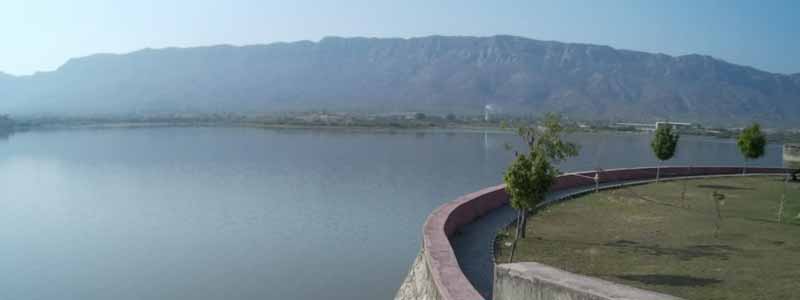
Lake Foy Sagar – Admire The Beautiful Sunset
Lake Foy Sagar, located near Ajmer in the Indian state of Rajasthan, is a serene and picturesque artificial lake that adds to the charm of this historic city. Built in 1892 by an English engineer named Mr. Foy, the lake was constructed with the primary purpose of providing employment to the local populace during a famine. The lake is named in his honor, acknowledging his contribution to the region.
Spread over a vast area, Lake Foy Sagar is surrounded by lush greenery and offers a tranquil escape from the hustle and bustle of city life. The calm waters of the lake reflect the clear blue sky and the surrounding hills, creating a mesmerizing and captivating scenery. The lake is an ideal spot for nature lovers and photographers who seek to capture the beauty of Rajasthan’s landscapes.
Boating facilities are available on the lake, allowing visitors to enjoy a peaceful ride while taking in the breathtaking views. The lake is also a popular picnic spot, attracting locals and tourists alike who come to unwind and appreciate the natural beauty of the surroundings. As the sun sets, the lake takes on a magical hue, making it a perfect setting for a romantic evening, Top 10 Things to Do in Ajmer.
Lake Foy Sagar stands as a testament to both human ingenuity and the harmonious integration of nature and architecture, making it a must-visit destination for those exploring the historical and scenic wonders of Ajmer.
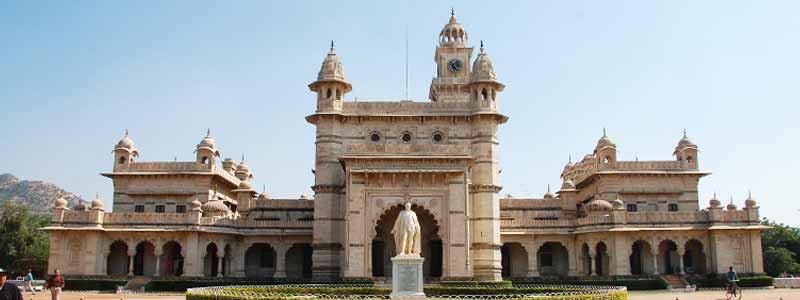
Mayo College – Behold The Architecture
Mayo College, located in Ajmer, Rajasthan, is one of India’s most prestigious and historic educational institutions. Founded in 1875 by Lord Mayo, the Viceroy of India, the college holds a distinguished place in the country’s educational landscape.
Spread across a sprawling campus, Mayo College is renowned for its architectural grandeur, combining traditional Rajasthani and colonial styles. The institution has consistently upheld a commitment to academic excellence, fostering holistic development among its students. The curriculum is designed to provide a well-rounded education, emphasizing not only academic achievement but also the development of character, leadership skills, and a sense of responsibility.
Mayo College’s vibrant and inclusive environment promotes a diverse range of extracurricular activities, including sports, arts, and cultural pursuits. The college has a rich tradition of producing scholars, leaders, and achievers who contribute significantly to various fields, Top 10 Things to Do in Ajmer.
The institution’s commitment to nurturing a global perspective is reflected in its diverse student body, attracting students from different parts of India and abroad. Mayo College has adapted to the changing times while preserving its timeless values, making it a beacon of educational excellence in the heart of Ajmer.
In summary, Mayo College stands as a symbol of academic prowess, cultural richness, and character development, making it a distinguished institution with a legacy that continues to inspire generations of students.
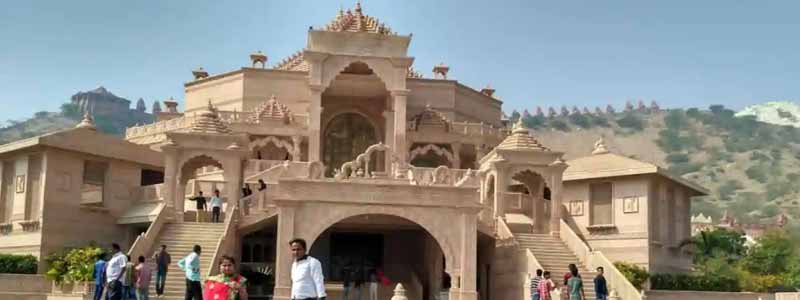
Soniji Ki Nasiyan – Pay Your Respects
Soniji Ki Nasiyan, also known as the Ajmer Jain Temple, is a spectacular architectural marvel located in the heart of Ajmer, Rajasthan, India. Built in the late 19th century, this Jain temple is dedicated to Lord Adinath, the first Tirthankara of Jainism.
The temple is renowned for its breathtaking beauty and intricate craftsmanship. The main attraction is the Swarna Nagari, a hall adorned with gold. The term “Soniji Ki Nasiyan” translates to “The Temple of Gold,” aptly describing the opulence of the structure. The inner sanctum houses a gold-plated model that represents the ancient city of Ayodhya.
One of the distinctive features of Soniji Ki Nasiyan is the depiction of the Jain philosophy through a series of fascinating dioramas. These intricate displays illustrate the life of Lord Adinath and significant events in Jain history. Pilgrims and tourists alike are captivated by the exquisite detailing and vibrant colors used in these artistic representations, Top 10 Things to Do in Ajmer.
The temple stands as a testament to the rich cultural and religious heritage of the Jain community. Pilgrims visiting Ajmer make it a point to explore the spiritual and aesthetic splendor of Soniji Ki Nasiyan, leaving with a deep appreciation for the Jain traditions and the architectural brilliance that defines this sacred site.
Daulat Bagh – Take A Peaceful Stroll
Daulat Bagh, located in Ajmer, India, is a historic garden that exudes an air of tranquility and architectural elegance. Built by Emperor Shah Jahan in the 17th century, this Mughal garden is a testament to the grandeur of the Mughal era. The name “Daulat Bagh” translates to “Garden of Wealth,” reflecting the opulence and richness of its design.
Spread across a sprawling expanse, the garden is adorned with meticulously laid out pathways, vibrant flowerbeds, and symmetrical water channels that enhance its visual appeal. At the heart of Daulat Bagh stands the imposing Shah Jahan’s Baradari, a pavilion with twelve pillars, which once served as a venue for royal gatherings and festivities.
The garden’s strategic location near the renowned Ajmer Fort adds to its historical significance, offering visitors a glimpse into the architectural marvels of the past. Surrounded by lush greenery, Daulat Bagh provides a serene retreat for locals and tourists alike, offering a respite from the hustle and bustle of urban life.
Today, Daulat Bagh stands as a living testament to the cultural and historical heritage of Ajmer, inviting visitors to stroll through its well-manicured landscapes and immerse themselves in the regal ambiance of Mughal architecture. It remains a cherished destination for those seeking a blend of history, nature, and architectural splendor, Top 10 Things to Do in Ajmer.
Jagat Palace – Stay Like Royalty
Jagat Palace in Ajmer is a captivating heritage hotel that seamlessly blends tradition with modern comfort. Nestled in the heart of the historic city, this architectural gem reflects the rich cultural tapestry of Rajasthan. The palace exudes an old-world charm with its intricate carvings, vibrant frescoes, and Rajputana architecture.
The regal ambiance of Jagat Palace is complemented by its luxurious accommodations, offering a glimpse into the royal lifestyle. The rooms and suites are adorned with traditional Rajasthani decor, creating a palatial retreat for guests. The hotel’s attention to detail and warm hospitality ensure a memorable stay.
The grandeur extends to the dining experience at Jagat Palace, where guests can savor authentic Rajasthani cuisine along with a diverse array of culinary delights. The rooftop restaurant provides a panoramic view of the city, making dining a delightful experience.
The palace also serves as an ideal venue for special occasions, including weddings and events. Its picturesque courtyards and majestic banquet halls create a fairy-tale setting for celebrations.
Beyond its opulent interiors, Jagat Palace is conveniently located near Ajmer’s prominent attractions, such as the Ajmer Sharif Dargah and the Ana Sagar Lake, allowing guests to explore the city’s historical and cultural heritage. Whether seeking a regal escape or a cultural adventure, Jagat Palace in Ajmer promises an enchanting stay that transports guests to a bygone era of Rajput splendor, Top 10 Things to Do in Ajmer.
Taragarh Fort – Explore!
Taragarh Fort, situated atop the Nagpahari Hill in Ajmer, Rajasthan, stands as a formidable testament to the region’s rich history and architectural prowess. Constructed in 1354 by Raja Ajai Pal Chauhan, the fort served as a strategic military stronghold for centuries.
The name “Taragarh” translates to “Star Fort,” a fitting title for a citadel that once boasted immense military significance. Its elevated location provides panoramic views of Ajmer and its surroundings, making it a vantage point for defense and surveillance. The fort is renowned for its massive stone walls, bastions, and intricate gateways, showcasing the architectural brilliance of its time.
One of the notable features of Taragarh Fort is the Bhim Burj, a large cannon positioned on the ramparts. Legend has it that the cannon was so powerful that it could propel its projectiles over great distances. The fort also houses various reservoirs, including the Bhimtal Tank and the Kakipura Tank, which played a crucial role in meeting the water needs of the fort’s occupants.
Despite the passage of centuries and the ravages of time, Taragarh Fort remains a captivating historical site, drawing visitors with its historical charm and commanding views of Ajmer. Exploring its winding pathways, ancient structures, and absorbing the echoes of the past, one can’t help but be transported to a bygone era of valor and grandeur Top 10 Things to Do in Ajmer.
Akbar Palace and Museum – Witness Its Grandeur
Akbar Palace and Museum in Ajmer, India, stands as a testament to the rich historical legacy of the region. Constructed during the Mughal era, the palace was commissioned by Emperor Akbar in the late 16th century. Its architecture reflects a blend of Mughal and Rajput styles, showcasing intricate carvings, ornate domes, and delicate jali work.
The palace has been meticulously preserved and transformed into a museum, offering visitors a captivating journey through the pages of history. The museum houses an extensive collection of artifacts, manuscripts, and artworks, providing a glimpse into the cultural and artistic heritage of the Mughal period. Exhibits include royal garments, antique weapons, and rare manuscripts that unravel the tales of a bygone era, Top 10 Things to Do in Ajmer.
One of the highlights of the Akbar Palace and Museum is its beautiful courtyard, adorned with lush gardens and fountains, creating a serene atmosphere. The museum not only serves as a repository of historical artifacts but also as a cultural hub, hosting events, lectures, and exhibitions to promote awareness and appreciation of the region’s rich history.
As visitors explore the Akbar Palace and Museum, they embark on a captivating journey through the opulent past of the Mughal Empire, gaining insights into the art, culture, and lifestyle of that era.

